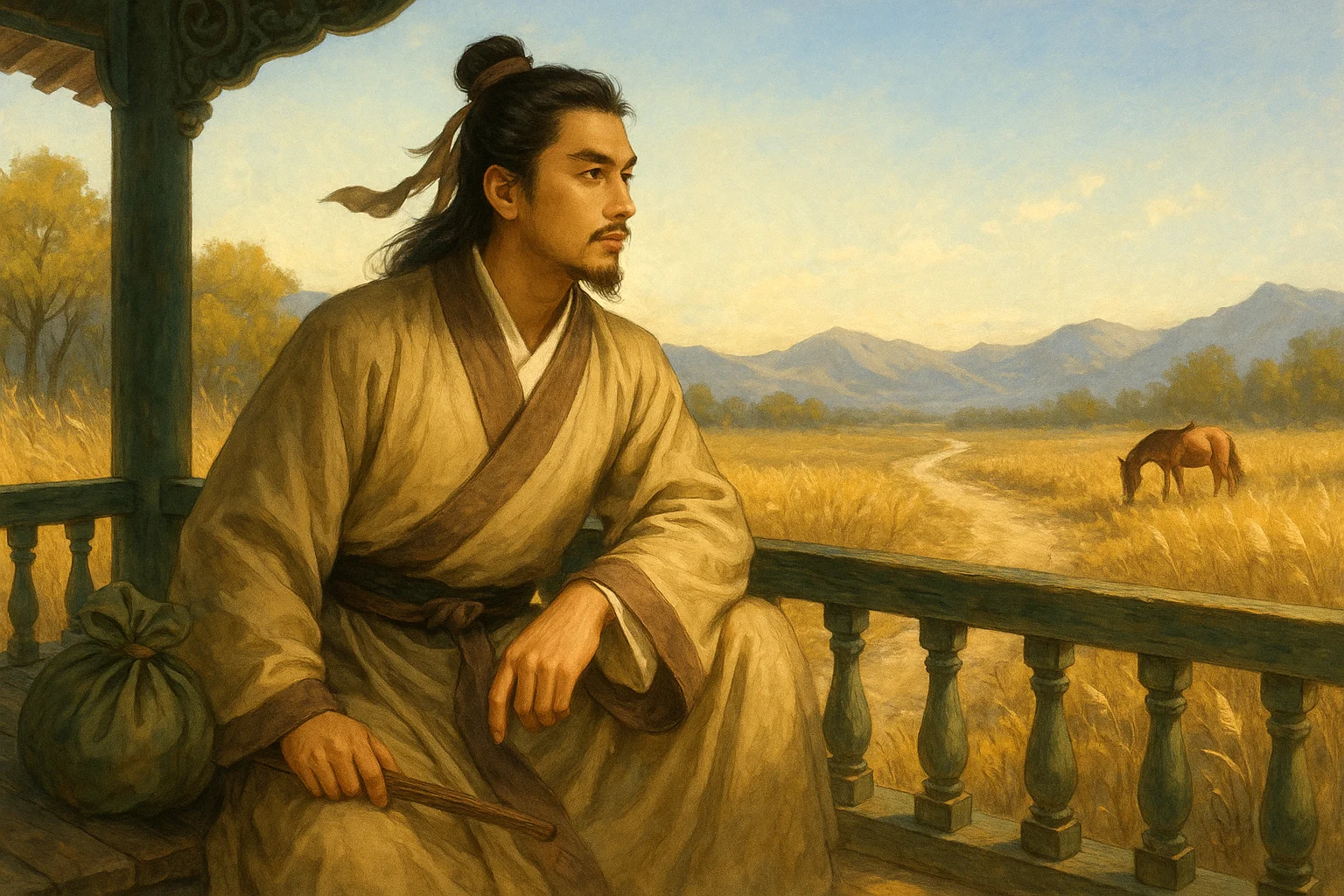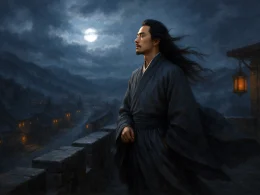Vast moon climbs the boundless skies,
Night deepens—light like snowdrift lies.
Frost chills the nomads’ tents outside,
Frontier towers house soldiers wide.
Autumn dew dims Longshan’s crest,
Beyond the dunes, cold sands gleam best.
Only homesick souls would know,
Why this flute melts hearts with snow.
Original Poem
「关山月」
司空曙
苍茫明月上,夜久光如积。
野幕冷胡霜,关楼宿边客。
陇头秋露暗,碛外寒沙白。
唯有故乡人,沾裳此闻笛。
Interpretation
This poem by Sikong Shu, a prominent figure among the Ten Literary Masters of the Dali era, revives the Han-dynasty tradition of frontier poetry to depict borderland desolation and soldiers' homesickness. Master of the five-character regulated verse, Shu here captures a sentry night's austere beauty, interweaving collective military hardship with intimate familial longing—a representative work of Mid-Tang frontier verse that balances social realism with lyrical vulnerability.
First Couplet: "苍茫明月上,夜久光如积。"
Cāngmáng míngyuè shàng, yè jiǔ guāng rú jī.
Through boundless dark the moon ascends— / Late in the watch, its light lies banked like snow.
The opening establishes a paradox: lunar radiance rendered palpable as accumulated mass ("banked like snow"). This synesthetic image—light possessing texture—heightens the frontier's tactile cold while foreshadowing the frost to come.
Second Couplet: "野幕冷胡霜,关楼宿边客。"
Yě mù lěng hú shuāng, guān lóu sù biān kè.
Frost from northern steppes invades field tents, / The watchtower beds its transient garrison.
"Steppe-frost" (胡霜) exoticizes the cold as barbarian intrusion, while "transient garrison" (边客) reduces soldiers to rootless sojourners. The couplet's verbs ("invades," "beds") anthropomorphize nature's assault on human fragility.
Third Couplet: "陇头秋露暗,碛外寒沙白。"
Lǒng tóu qiū lù àn, qì wài hán shā bái.
Longshan's crest drowns in autumn dew, / Beyond the dunes, frozen sands glare white.
Visual tension dominates: "drowns in dew" (暗, lit. "darkens") contrasts with "glare white" (白), mapping the soldiers' psychological extremes—claustrophobic gloom versus exposed desolation. The frontier becomes a liminal space between suffocation and void.
Fourth Couplet: "唯有故乡人,沾裳此闻笛。"
Wéi yǒu gùxiāng rén, zhān shang cǐ wén dí.
Only homeland kin, hearing this flute, / Find their sleeves stained by unseen tears.
The finale performs emotional alchemy: the frontier flute's sound bridges impossible distances, its vibrations transmuting into liquid grief ("stained sleeves"). The exquisite "unseen tears" (沾裳不直言泪) epitomizes Tang poetic restraint—where absence speaks louder than presence.
Holistic Appreciation
"Moon Over Mountain Pass" masterfully depicts frontier nights and soldiers' nostalgia through tightly structured five-character verse. The first six lines paint a desolate landscape—pale moonlight, heavy frost on cold sands—creating an atmosphere of solitary hardship. The concluding couplet delivers the emotional crescendo, where a distant flute's lament mirrors homesick tears with poignant resonance.
The poem exhibits meticulous craftsmanship through its clear "scene-to-emotion" progression, embodying classic frontier poetry's melancholic grandeur. Unlike contemporaries Gao Shi or Cen Shen who glorified battlefield heroics, Sikong Shu prioritizes psychological nuance. His restrained yet tender language captures soldiers' quiet sorrow and longing, infusing the work with deeply humanistic warmth.
Artistic Merits
- Chiseled Imagery, Measured Diction
Cold-toned motifs—"moon," "frost," "dew," "frigid sands"—construct a vast, barren aesthetic that mirrors the soldiers' isolation, achieving sublime harmony between physical and emotional desolation. - Scene-Emotion Alchemy
Natural descriptions transcend mere landscape painting. The transitional flute in the final couplet bridges external and internal worlds, merging sight and sentiment with organic power. - Architectural Precision
Six lines of layered imagery culminate in the titular "mountain pass" resolving into "hometown kin," completing a masterful narrative arc from desolate frontier to intimate humanity.
Insights
This poem demonstrates that true poetry thrives not in ornate language, but in the fusion of scene and sentiment. Sikong Shu's sparse diction conjures vast wilderness and profound emotion alike. His understated portrayal of soldier-family bonds exemplifies artful restraint—subtle yet devastatingly moving.
Modern readers navigating their own "frost-lit sands" of adversity may find solace in its timeless truth: even across distance and turmoil, the flute-song of human connection endures. Such verse remains immortal precisely because its emotional core transcends eras—a testament to poetry's power to articulate our deepest shared longings.
About the poet

Sikong Shu (司空曙), c. 720 – c. 790, courtesy name Wenming, was a native of Guangping (present-day Yongnian County, Hebei Province). A renowned mid-Tang dynasty poet, he was one of the "Ten Literary Masters of the Dali Era," alongside Lu Lun, Qian Qi, Han Hong, Li Duan, and others. Though his life lacked illustrious achievements, his poetry—marked by genuine emotion in simplicity and profound contemplation in solitude—secured him a unique place in mid-Tang literary circles.












